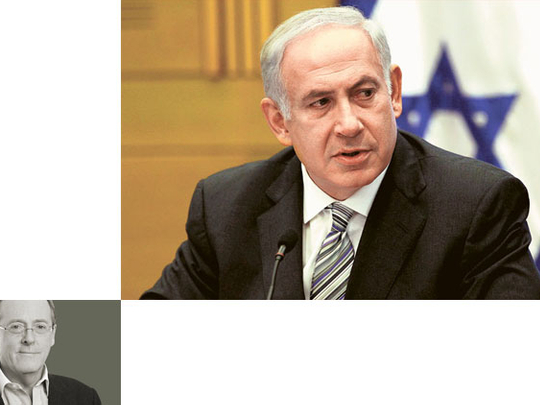
The schizophrenic language heard last month at the United Nations General Assembly about Iran could make people believe that it is enough to say things for them to happen. “Once equipped with the nuclear arm, Iran represents a challenge that cannot be contained. It could risk provoking the elimination of Israel and threatening Gulf countries’ security and world economic stability”, US President Barack Obama said. In other words, would Iran have the bomb, the first thing it would do would be to drop it over Israel.
“Iran will have the bomb next summer”, Israeli Prime Minister, Benjamin Netanyahu, added — which actually meant Iran would have enough enriched uranium next summer to make a nuclear bomb. But then, will Iran be willing to do it (beyond the fact it always denied it)? Would Netanyahu’s words be, by nature, more trustworthy than Iranian ones?
The Iranian nuclear issue has been one of the more tortuous diplomatic questions of the last ten years, for at least two reasons: It is based on presuppose and hidden evidence.
Presuppose is that whenever Iran has an atomic bomb, it will drop it on Israel to destroy it — and then be destroyed itself more or less simultaneously.
The hidden evidence is that there is a country in the region and one country alone, which has enough atomic bombs to destroy the entire region. That country is Israel, not Iran.
Actually, the Iranian nuclear saga looks like a three-storey rocket.
The first storey is the one of processes of intent, intellectual manipulations and straightforward lies. The Israeli Prime Minister, Benjamin Netanyahu, obviously leads the show, followed by the US and what remains of a European diplomacy. For these people, there cannot be any doubt that if Iran wants to develop nuclear energy, it is of course in order to develop a military capacity and use it inexorably against Israel. Having the bomb, “Iran could hit Israel”, Netanyahu said, which in his words means that “it will”. Iran may have denied it repeatedly, but why believe it when, on the contrary, it is so obvious that former UK premier Tony Blair (announcing that Saddam Hussain’s rocket could hit London) or former US Secretary of State Colin Powell (showing his ‘proof’ that Saddam had the bomb) should not have been unconditionally trusted?
The second storey of the rocket is an endless discussion about how far the Iranians are from having the bomb. European chancelleries have specialised in that space where the answers depend on everyone’s own standpoint. Neo-conservative analysts would normally think it is a matter of months. Former French ambassador in Iran, Francois Nicoullaud, in a recent article after last summer’s Moscow negotiations, was more cautious. He notably explained how the last round was not productive because of both, unsatisfactory compensations offered by the western camp and ill-conceived requests which had little to do with the fight against nuclear proliferation (including transferring material from Fordo to Natanz, where it could be more easily hit by US bombs). Last, one should not forget that producing a bomb is a thing and launching it in a reasonable miniaturised, short or medium range vector is something else.
Actually, the third storey of the rocket is the more interesting one. Let’s assume that Iran finally managed to have a nuclear bomb — Israeli strikes may slow down the process, but all experts agree, no one will ever stop Iran from making a bomb if it so wishes. What will then happen?
The so-called “deterrent doctrine” effectively says: “I make my own bomb, so that you are sure that if you hit me with yours, I will hit you with mine.” The world has been living more or less in peace for the last 60 years — thanks to this doctrine. So it shouldn’t be that bad. Of course, it is better to get rid of excessive stocks, as the Americans and the Russians have notably done for the last ten years.
But why cannot this apply to the region? Because, as one knows, there is one country that alone has enough bombs to destroy the entire area — incidentally, Israel neither acknowledges it nor is monitored by the International Atomic Energy Agency, unlike Iran. Would Arab states feel more secure when Israel says they just want to protect themselves, than when Iran says much of the same?
An article by Berkeley Professor Kenneth Waltz in last summer’s issue of Foreign Affairs magazine, Why Iran should have the atomic bomb, was not only provocative. It just reminded of the basics of any nuclear doctrine, e.g. the need of balance. And there is no balance in the region. Waltz also added that it seemed clear Iran had no sense of irrationality or desire of auto destruction. Whoever launches a bomb is sure to face retaliation.
Unfortunately, the international community headed by the US and Israel prefer to go on shouting slogans instead of reflecting seriously on a complex and multifaceted issue. They prefer, as the US has just done, withdraw from their black list the Iranian People’s Mujahideen Organisation, whose terror track record is well established, or insist on “putting higher pressure on the Iranians” and harden the embargo. Yet, who is actually the major nuclear threat in the region, if not Israel?
Luc Debieuvre is a French essayist and a lecturer at IRIS (Institut de Relations Internationales et Strategiques) and the FACO Law University of Paris.










